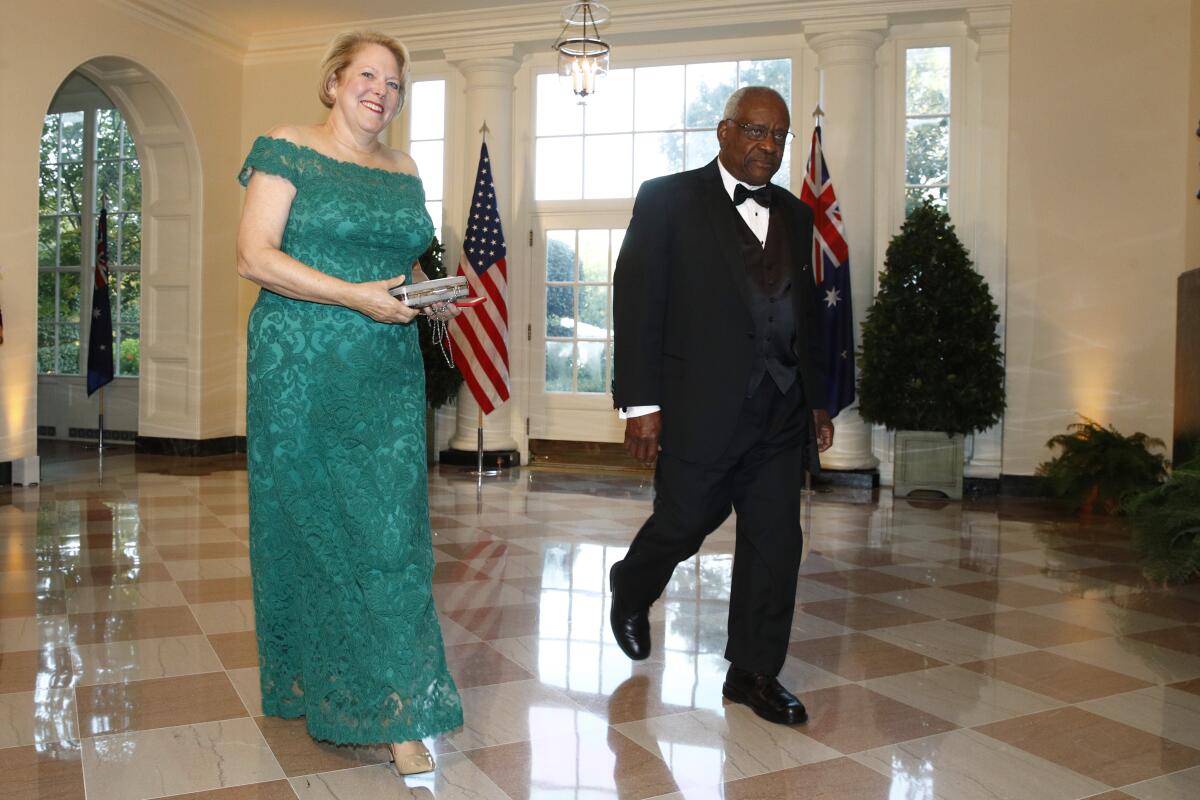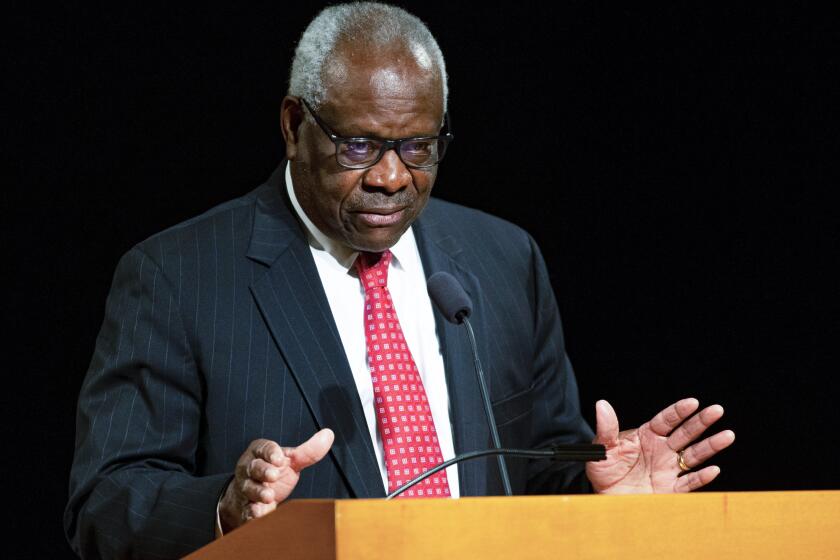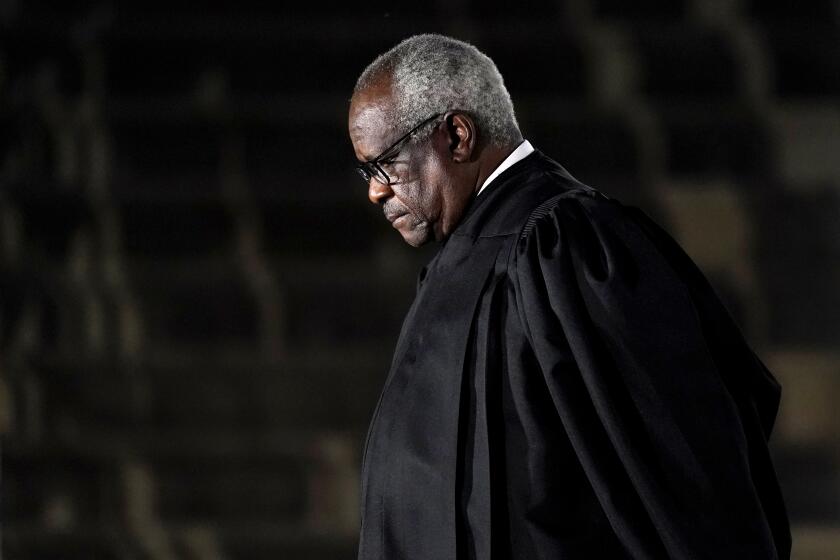Column: Here’s action we could take on Clarence Thomas’ full-blown ethics scandal

- Share via
Supreme Court Justice Clarence Thomas should resign. But he won’t.
Nor, insiders believe, will the supine Chief Justice John G. Roberts Jr. nudge Thomas to go, as another chief pushed a scandal-scarred colleague to exit 54 years ago.
And neither will our tribally divided, calcified Congress remove Thomas from office. Republicans who run the House Judiciary Committee reacted to this week’s revelations involving Thomas’ ethics problems by tweeting a goat emoji suggesting that Thomas is “the greatest of all time.”
Opinion Columnist
Jackie Calmes
Jackie Calmes brings a critical eye to the national political scene. She has decades of experience covering the White House and Congress.
Yet this, too, is certain: Inaction is not an option at this point.
No, not after the spate of reported outrages and allegations involving Thomas as well as his wife, longtime right-wing activist Virginia “Ginni” Thomas. Not if the nation is to stanch the bleeding of the public’s trust in its highest court, a trust already at historic lows in national polls and yet essential to the citizenry’s acceptance of the court’s rulings.
We are way beyond a critical mass of reasons for action against Thomas, the court’s longest-serving justice.
The public is still digesting ProPublica’s continuing investigations of Thomas’ relationship with conservative Texas billionaire Harlan Crow. In April, the nonprofit news site revealed that Thomas had taken luxury vacations over more than 20 years, paid for by Crow, as well as Crow’s purchase and renovation of Thomas family properties in Georgia, almost none of which Thomas disclosed on federal financial reports, as required by post-Watergate law.
How hard could it be for Clarence Thomas, the longest-serving Supreme Court justice, to figure out how to follow financial disclosure law?
On Wednesday, ProPublica reported that in 2008 and 2009, Crow had paid the tuition for Thomas’ grandnephew at two boarding schools, one of which charged $6,200 a month; the Thomases were the boy’s legal guardians. That gift also went unreported on Thomas’ annual financial disclosure forms.
Then on Thursday, the Washington Post dropped its bomb: Conservative activist Leonard Leo, the longtime Federalist Society leader who has steered right-wing judges to the Supreme Court to form the court’s conservative supermajority, funneled possibly up to $100,000 to Ginni Thomas for unspecified consulting work just over a decade ago. (This was not long after she had formed an advocacy group called Liberty Central with an unreported half-million dollars from Crow.)
The conduit for her cash from Leo, according to documents the Post reviewed, was Kellyanne Conway, a pollster who would later become Donald Trump’s advisor in the White House. The cost was billed to a conservative nonprofit organization that Leo and Conway advised, and that was involved in a voting rights case then before the Supreme Court.
The latest case before the Supreme Court might directly implicate Ginni Thomas in one of the attempts to undo the 2020 election.
Leo directed Conway at one point to “give” Ginni Thomas “another $25K,” adding that the paperwork should have “no mention of Ginni, of course.”
Of course.
What are they trying to hide? Well, Leo told the Post, “Knowing how disrespectful, malicious and gossipy people can be, I have always tried to protect the privacy of Justice Thomas and Ginni.”
If Thomas wants total privacy, he should get off the court. But so long as he’s got the lifetime job, he’s subject to a federal law requiring that officials like himself annually report their sources of income and that of their spouses. He’s violated the spirit if not the letter of the law before, repeatedly, including by omitting income streams totaling $700,000 and $200,000 that his wife got from conservative groups in past years.
All of this willful disregard for the appearances of conflicts of interest comes on top of another outrage unrelated to finances: Thomas’ refusal to recuse himself from cases involving the Jan. 6, 2021, insurrection despite his wife’s documented involvement in the efforts to overturn President Biden’s election.
The justice, in keeping with his very apparent sense of impunity, refused to talk to the investigative reporters who wrote the latest pieces. Of his extravagant vacations at Crow’s expense, Thomas dismissed any suggestion that he should report the gifts, saying they were simply “hospitality” by Crow and his wife, who were “among our dearest friends.”
They may be dear friends, but Crow and Thomas met when Thomas was a justice, already passing final judgment on cases including those in which conservative groups that Crow bankrolls had a stake.
So many unanswered questions, so little accountability. What we have here is a scandal. If neither the court nor Congress will address Thomas’ transgressions with the seriousness they deserve, we must fall back on the only other institution with any sway over justices.
The Judicial Conference of the United States, a committee of federal judges whose responsibilities include policing federal financial disclosure reports, must rouse itself to thoroughly review Thomas’ reports through the years and see that he corrects all omissions. And then it should refer its findings on his unreported income, gifts and real estate deals to prosecutors at the Justice Department.
We can’t have one of the nine Americans who are the last word on the law be immune to the law.
More to Read
A cure for the common opinion
Get thought-provoking perspectives with our weekly newsletter.
You may occasionally receive promotional content from the Los Angeles Times.














